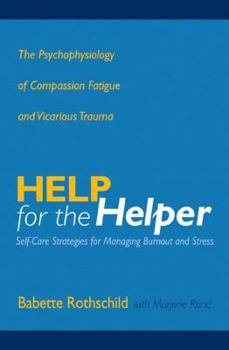Help for the Helper: The Psychophysiology of Compassion Fatigue and Vicarious Trauma
Select Format
Select Condition 
Book Overview
Therapist burnout is a pressing issue, and self-care is possible only when therapists actively help themselves. The authors examine the literature from neurobiology, social psychology, and folk psychology in order to explain how therapists suffer from an excess of empathy for their clients, and then they present strategies for dealing with burnout and stress.
Format:Hardcover
Language:English
ISBN:039370422X
ISBN13:9780393704228
Release Date:March 2006
Publisher:W. W. Norton & Company
Length:272 Pages
Weight:1.27 lbs.
Dimensions:1.0" x 6.4" x 9.4"
Customer Reviews
3 ratings
Wonderful Book
Published by Thriftbooks.com User , 15 years ago
I am so glad I was assigned this book in social work school. I experienced compassion fatigue shortly before reading this book after witnessing a particularly traumatic hospitalization. The book superbly described to me what I was experiencing and made me more at ease. I already meditate, but the book has that and other excellent self-care suggestions that all in the helping professions should be aware of.
help for the helper
Published by Thriftbooks.com User , 18 years ago
this is an excellent resource book both for personal as well as professional reasons. i wish this book was available 30 + years ago when I started my journey of helping others. this book should be included into the required reading of any psych/counseling curriculum.
Thank you! This book will help many helping professionals.
Published by Thriftbooks.com User , 19 years ago
I read Help for the Helper cover to cover as soon as it arrived and all I can say is WOW and THANK YOU!! This is a book that addresses the needs of helping professionals--all sorts! Babette Rothschild begins the book with a preface on "Common Sense;" something we all need for taking care of ourselves (and our clients, for that matter). She's become a kind of champion of Common Sense in psychology and I'm glad to see her apply this important life-tool to the self-care of professionals. Her three central chapters begin with theory of neurophysiology: on Empathy, Arousal and Clear Thinking. She then goes on to outline things we can easily do to combat the consequences of our work and avoid burnout, vicarious trauma and compassion fatigue. Though the book examples are pointed to psychotherapists, the theory and the exercises will be useful to anyone (like me) in the helping professions. One thing that stands out is that she underscores us each finding the tools that help us best. She offers expert advice without having to be "the" expert. Consistent with her advocacy of common sense, she knows that each professional has to find his or her optimal combination of resources. For those who are interested in neurophysiology, this book covers cutting edge theories and research, including the recent discovery of mirror neurons. For the psychotherapist, sections on countertransference and projective identification offer a fresh view on these core concepts. I believe that anyone in the helping professions, including those who pitch in following disasters, will find this book to be a huge help for their own well-being.





